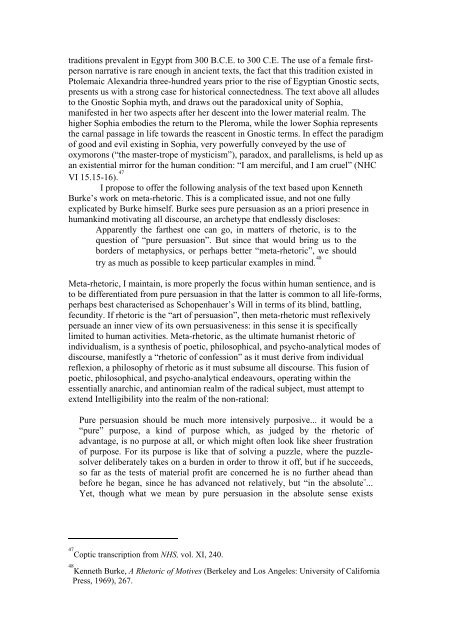THE EGYPTIAN FOUNDATIONS OF GNOSTIC THOUGHT
THE EGYPTIAN FOUNDATIONS OF GNOSTIC THOUGHT
THE EGYPTIAN FOUNDATIONS OF GNOSTIC THOUGHT
Create successful ePaper yourself
Turn your PDF publications into a flip-book with our unique Google optimized e-Paper software.
traditions prevalent in Egypt from 300 B.C.E. to 300 C.E. The use of a female firstperson<br />
narrative is rare enough in ancient texts, the fact that this tradition existed in<br />
Ptolemaic Alexandria three-hundred years prior to the rise of Egyptian Gnostic sects,<br />
presents us with a strong case for historical connectedness. The text above all alludes<br />
to the Gnostic Sophia myth, and draws out the paradoxical unity of Sophia,<br />
manifested in her two aspects after her descent into the lower material realm. The<br />
higher Sophia embodies the return to the Pleroma, while the lower Sophia represents<br />
the carnal passage in life towards the reascent in Gnostic terms. In effect the paradigm<br />
of good and evil existing in Sophia, very powerfully conveyed by the use of<br />
oxymorons (“the master-trope of mysticism”), paradox, and parallelisms, is held up as<br />
an existential mirror for the human condition: “I am merciful, and I am cruel” (NHC<br />
VI 15.15-16). 47<br />
I propose to offer the following analysis of the text based upon Kenneth<br />
Burke’s work on meta-rhetoric. This is a complicated issue, and not one fully<br />
explicated by Burke himself. Burke sees pure persuasion as an a priori presence in<br />
humankind motivating all discourse, an archetype that endlessly discloses:<br />
Apparently the farthest one can go, in matters of rhetoric, is to the<br />
question of “pure persuasion”. But since that would bring us to the<br />
borders of metaphysics, or perhaps better “meta-rhetoric”, we should<br />
try as much as possible to keep particular examples in mind. 48<br />
Meta-rhetoric, I maintain, is more properly the focus within human sentience, and is<br />
to be differentiated from pure persuasion in that the latter is common to all life-forms,<br />
perhaps best characterised as Schopenhauer’s Will in terms of its blind, battling,<br />
fecundity. If rhetoric is the “art of persuasion”, then meta-rhetoric must reflexively<br />
persuade an inner view of its own persuasiveness: in this sense it is specifically<br />
limited to human activities. Meta-rhetoric, as the ultimate humanist rhetoric of<br />
individualism, is a synthesis of poetic, philosophical, and psycho-analytical modes of<br />
discourse, manifestly a “rhetoric of confession” as it must derive from individual<br />
reflexion, a philosophy of rhetoric as it must subsume all discourse. This fusion of<br />
poetic, philosophical, and psycho-analytical endeavours, operating within the<br />
essentially anarchic, and antinomian realm of the radical subject, must attempt to<br />
extend Intelligibility into the realm of the non-rational:<br />
Pure persuasion should be much more intensively purposive... it would be a<br />
“pure” purpose, a kind of purpose which, as judged by the rhetoric of<br />
advantage, is no purpose at all, or which might often look like sheer frustration<br />
of purpose. For its purpose is like that of solving a puzzle, where the puzzlesolver<br />
deliberately takes on a burden in order to throw it off, but if he succeeds,<br />
so far as the tests of material profit are concerned he is no further ahead than<br />
before he began, since he has advanced not relatively, but “in the absolute ” ...<br />
Yet, though what we mean by pure persuasion in the absolute sense exists<br />
47<br />
Coptic transcription from NHS, vol. XI, 240.<br />
48<br />
Kenneth Burke, A Rhetoric of Motives (Berkeley and Los Angeles: University of California<br />
Press, 1969), 267.










